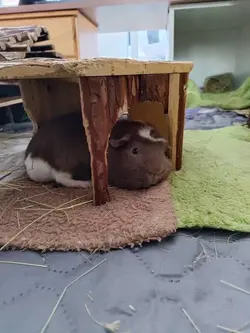Shirii
New Born Pup
Hello,
two weeks ago I noticed my little piggy boy Kiro was crying and hunching during urination. I immidietly took him to vet and since then he has been on sumetrolim antibiotics, meloxicam for pain, uroxal for urinary sediment reduction and rodicare uro as a dietary supplement for the bladder. As the vet found sediment and blood in his urine but no bladder stone appeared on X-ray.
He had an ultrasound and a follow-up x-ray at the vet today, just to confirm nothing has formed there since then a ultrasound to confirm that there are no stones, that would be too small for x-ray. Still no urinary stones were found and the sediment in his urine is finally at normal values. However, he still has blood in his urine and it is not at all clear what is causing it.
He is over all very heatlhy piggy. The weigth is 1250g, he is very active and runs around all the time, we went throught his diet with the vet and there seems to be nothing, that could cause this.
The only problem he ever had was little bumb on his butt, which turned out to be tumor and as it was well sealed, vet was able to be removed without complications this april. Here is a post I made about that Lump with red dots above butt
I also attached a video from two weeks ago, when he was in pain. He is not doing it anymore, but that might be thanks to maloxicam. As well as one cute photo of him.
The vet told me to keep giving the same meds for another week, just to lower the dosage of meloxicam, and come in for a cotrol in a week and then we'll see.
Has anyone had similar experiences or ideas what might be causing it?
two weeks ago I noticed my little piggy boy Kiro was crying and hunching during urination. I immidietly took him to vet and since then he has been on sumetrolim antibiotics, meloxicam for pain, uroxal for urinary sediment reduction and rodicare uro as a dietary supplement for the bladder. As the vet found sediment and blood in his urine but no bladder stone appeared on X-ray.
He had an ultrasound and a follow-up x-ray at the vet today, just to confirm nothing has formed there since then a ultrasound to confirm that there are no stones, that would be too small for x-ray. Still no urinary stones were found and the sediment in his urine is finally at normal values. However, he still has blood in his urine and it is not at all clear what is causing it.
He is over all very heatlhy piggy. The weigth is 1250g, he is very active and runs around all the time, we went throught his diet with the vet and there seems to be nothing, that could cause this.
The only problem he ever had was little bumb on his butt, which turned out to be tumor and as it was well sealed, vet was able to be removed without complications this april. Here is a post I made about that Lump with red dots above butt
I also attached a video from two weeks ago, when he was in pain. He is not doing it anymore, but that might be thanks to maloxicam. As well as one cute photo of him.
The vet told me to keep giving the same meds for another week, just to lower the dosage of meloxicam, and come in for a cotrol in a week and then we'll see.
Has anyone had similar experiences or ideas what might be causing it?
